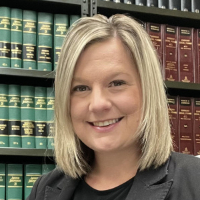Bristol Estate Lawyer, Indiana
Kayla Anne Christofeno
✓ VERIFIEDCriminal, Estate
Kayla Christofeno is a skilled criminal defense attorney with experience defending many different types of crimes. She is a lifelong resident of Elkh... (more)
Andrew Gary Helfrich
Real Estate, Health Care, Estate, Business
Status: In Good Standing Licensed: 20 Years
Timothy Allen Weaver
Government, Estate, Corporate, Business
Status: In Good Standing Licensed: 28 Years
Rachel Ann Stuckey
Estate, Employment, Civil & Human Rights, Medical Malpractice
Status: In Good Standing Licensed: 8 Years
Loraine Powell Troyer
Trusts, Estate, Bankruptcy, Bankruptcy & Debt
Status: In Good Standing Licensed: 40 Years
Richard E. Bryant
Estate, Accident & Injury, Lawsuit & Dispute, Real Estate, Bankruptcy & Debt
Status: In Good Standing


